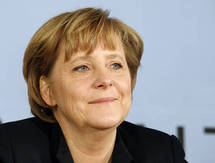
"I still remember, it was a wonderfully warm spring day in Berlin," said Merkel, a trained physicist, recalling October 3, 1990, when the treaty merging the capitalist West Germany and communist East Germany came into effect.
"In the afternoon, I went for a walk with my husband ... through the Brandenburg Gate. And I will never forget the night before, the amazing atmosphere in front of the Bundestag and the fireworks at midnight to celebrate reunification."
She said she had no ambitions at that time to be chancellor, but vowed to campaign for a seat in parliament.
At one point in the interview, the usually reserved chancellor appeared to get carried away with her reminiscing, saying: "My God, I can't believe I'm telling you all this."
"Suddenly I could really do everything that I had before only visualised. For example, I had always dreamed about going to the United States as a pensioner -- and that came true much earlier."
East Germans were generally denied the right to travel to the West until they retired.
Merkel said she "always had the feeling in East Germany that I could not achieve the limits of my potential." That was "an especially important change" that came about with reunification, added the chancellor.
Nevertheless, despite the constraints of life under communism, "it is certainly true to say that it was not boring," she said.
"We read, we went for lovely journeys in Eastern Europe ... Life in East Germany was arduous, regimented and limited, but we tried to make something of it," she said.
With hundreds of thousands of fellow Germans, Merkel on Sunday will take part in celebrations marking two decades since reunification with street parties in the northern city of Bremen.
--------------------------------------------------------------------------
"In the afternoon, I went for a walk with my husband ... through the Brandenburg Gate. And I will never forget the night before, the amazing atmosphere in front of the Bundestag and the fireworks at midnight to celebrate reunification."
She said she had no ambitions at that time to be chancellor, but vowed to campaign for a seat in parliament.
At one point in the interview, the usually reserved chancellor appeared to get carried away with her reminiscing, saying: "My God, I can't believe I'm telling you all this."
"Suddenly I could really do everything that I had before only visualised. For example, I had always dreamed about going to the United States as a pensioner -- and that came true much earlier."
East Germans were generally denied the right to travel to the West until they retired.
Merkel said she "always had the feeling in East Germany that I could not achieve the limits of my potential." That was "an especially important change" that came about with reunification, added the chancellor.
Nevertheless, despite the constraints of life under communism, "it is certainly true to say that it was not boring," she said.
"We read, we went for lovely journeys in Eastern Europe ... Life in East Germany was arduous, regimented and limited, but we tried to make something of it," she said.
With hundreds of thousands of fellow Germans, Merkel on Sunday will take part in celebrations marking two decades since reunification with street parties in the northern city of Bremen.
--------------------------------------------------------------------------









 Home
Home Politics
Politics









